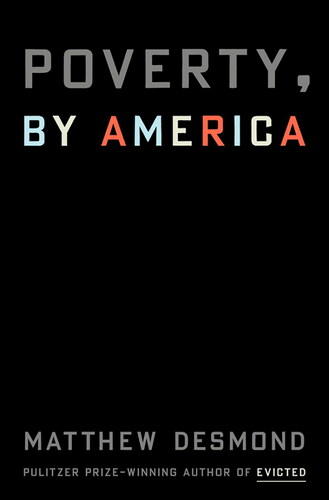Matthew Desmond’s (Citation2016) book Evicted brought the issue of eviction into mainstream awareness, dramatically increasing attention to the issue by researchers and policymakers. Desmond’s new book, Poverty, By America, takes on a much broader and more complex issue and attempts to distill it into a concise message. In short, Desmond argues that poverty persists because we all benefit from it. This ambitious book offers a portrait of poverty, an argument about what keeps us all from abolishing it, and a way forward.
This is not a new argument: The systemic benefits of poverty and exploitation is well-trod territory in social theory. But Desmond looks beyond those who benefit the most or most directly, or whose behavior is most predatory; he implicates all who are not poor. He avoids making an ideological argument, instead using examples and research findings to make his case to a general audience. After decades of focus on the poor themselves, it is certainly time to revisit and update arguments and evidence about the larger forces shaping their choices and behavior.
The opening chapter describes how poverty infects all aspects of a poor person’s life, in a “relentless piling on of problems” (p. 13) resulting in poor physical and mental health, and “a tight knot of social maladies…connected to every social problem we care about” (p. 23). The poorest, those living in what Desmond calls “abject poverty,” often experience “the feeling that your government is against you” (p. 19). As sentiment in many cities has turned against the homeless and local governments increasingly embrace policies that effectively criminalize their presence in public places, this statement seems particularly apt.
Desmond reviews and rejects common arguments for our lack of progress in reducing the poverty rate, despite increased spending on anti-poverty programs. These include the diversion of funds intended to alleviate poverty, the role of immigration, and the role of single parenthood. He debunks each argument, highlighting contradictions between anti-poverty rhetoric and government actions.
He then turns to his central argument: the ways the rest of us exploit or benefit from the exploitation of the poor. He updates evidence of the degradation of jobs at the low end of the labor market and the ways the poor—particularly Black Americans—are preyed upon and overpay for essential items like housing and access to cash and credit.
Government is part of the problem, through the dependence of the non-poor on tax subsidies weighted heavily toward the wealthiest. Our growing aversion to using services we associate with the poor reinforces our retreat from the public realm and resistance to investing in it.
He proposes bold solutions. Rather than using social cost arguments (e.g., you’ll be better off if we help the poor) he estimates the cost of eliminating poverty and identifies the funds necessary to close that $177 billion gap from the $1 trillion per year in uncollected taxes or the taxes that would be paid under a rebalanced, fairer tax code. All of us who benefit from government largesse now would pay more. Desmond argues that we should avoid approaches aligned with exploitation of the poor (e.g., vouchers that support high rents, tax credits subsidizing low wage bills for employers), focusing instead on increasing workers’ bargaining power, offering poor people housing choices beyond the private rental market, and providing access to credit and decent public services. And we should ensure the poor can access the benefits we fund now.
He adds some significant qualifications: Policies must be supported by broad coalitions and avoid stirring up resentment. We should pursue forms of targeted universalism, balancing meaningful assistance to those who most need it with serving a broad enough constituency to be perceived as universal.
Desmond’s arguments about our embrace of economic extremities are particularly relevant for planners. How can we address the root causes of poverty rather than address the symptoms? His argument should make us think about the ways we shape the public realm, the quality of services and the built environment across our cities, and where rental housing can be built. These are consistent with our ethical obligation to “faithfully serve the public interest…[and]…expand choice and opportunity for all persons, recognizing a special responsibility to plan for the needs of disadvantaged groups and persons” and for “the interrelatedness of decisions and the long-range consequences of present action” (APA, Citation1992) and also about our individual choices as consumers and investors.
This ambitious book is ultimately about building a new narrative about poverty, our role in it, and our obligation to act. It will likely not convince those most hostile to the poor, but it is a powerful diagnosis of our complicity in maintaining poverty. Directing our efforts toward dismantling the systemic exploitation of the poor will remove the shame of knowing “our abundance causes others’ misery” (p. 181).
Additional information
Notes on contributors
Elizabeth J. Mueller
ELIZABETH J. MUELLER is professor of community and regional planning and social work at the University of Texas at Austin.
References
- American Planning Association. (1992). Ethical principles in planning. Statement adopted by the APA Board, May 1992. https://www.planning.org/ethics/ethicalprinciples/
- Desmond, M. (2016). Evicted: Poverty and profit in the American city. Crown Publishing.

